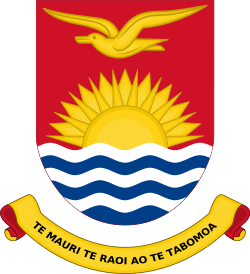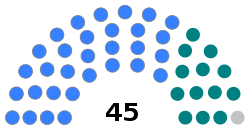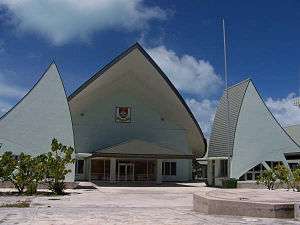House of Assembly (Kiribati)
The House of Assembly (official constitutional name: Maneaba ni Maungatabu in Gilbertese or "maneaba of the Sacred Mountain") is the Legislature of Kiribati. It has 45 members, 44 elected for a four-year term in 23 single-seat and multi-seat constituencies and 1 delegate from the Banaban community on Rabi Island in Fiji (chosen by the Rabi Council of Leaders). If the Attorney general was not elected as MP, he or she has been an ex-officio member of it, from 1979 to 2016, when a change of the constitution modified this provision.
House of Assembly Maneaba ni Maungatabu | |
|---|---|
 | |
| Type | |
| Type | |
| History | |
| Founded | 12 July 1979 1 May 1974 (as House of Assembly of the Gilbert and Ellice Islands) 1 January 1976 (as House of Assembly of the Gilbert Islands) |
| Leadership | |
Tangariki Reete (since 2020) | |
| Structure | |
| Seats | 45 members (44 elected + 1 nominated Member) |
 | |
Political groups | Tobwaan Kiribati Party (22) Boutokaan Kiribati Moa Party (22) |
| Elections | |
| modified two-round system | |
Last election | 14 April 2020 (first round) |
Last election | 22 April 2020 (second round) |
Next election | 2024 |
| Meeting place | |
 | |
| Ambo, South Tarawa | |
| Website | |
| www | |
 |
|---|
| This article is part of a series on the politics and government of Kiribati |
|
Created by the Constitution of 12 July 1979, in a Westminster system, its seat has been at Ambo in South Tarawa since October 2000. From 1979 to 2000, it was at Bairiki, where the House of Assembly was created in 1974, on the base of the Legislative Council of the British colony, created in 1970.
History
A new constitution entered into effect on 1 May 1974, creating a House of Assembly of 28 members from the previous Legislative Council of the Gilbert and Ellice Islands colony. The 8 members of the Ellice Islands created an Ellice committee and, after referendum, left the House of Assembly on 1 January 1976 to become the Fale i Fono on Funafuti, the new capital of Tuvalu. The first specific to Gilbert Islands House of Assembly was so created on 1 January 1976, just after the separation with the Ellice Islands, decided on 1st October 1975, to prepare the following independence of Kiribati and the Constitution of 12th July 1979. The former House of Assembly took its new constitutional name of Maneaba ni Maungatabu on 12 July 1979. The House of Assembly continued until independence when it became the Maneaba ni Maungatabu with 35 elected members, one nominated member (from Rabi) and one ex-officio member (the Attorney-General). The total number of elected members has, at the 2007 elections, increased to 44 making a 46 member unicameral parliament. In 2016, a modified constitution had suppressed the Ex-officio member with the creation of a new Ministry of Justice.
Attorney general, former ex-officio member
Since October 2016, Honourable Ms Tetiro Semilota is the Attorney General of Kiribati. She is no more Ex-officio member of the House of Assembly since.
Speaker
The Maneaba has a Speaker, elected by its members from outside Parliament, per section 71 of the Constitution.[1]
At the first parliamentary session following a general election, the Chief Justice presides over the Maneaba to take nominations for the office of Speaker. Voting is done by secret ballot, and a candidate must receive an absolute majority of votes cast to be elected. Should more than two candidates be nominated, the candidate with the lowest number of votes is eliminated after each round of voting until one candidate wins.[2]
The Speaker of the Maneaba does not have a vote on any matter. Should a vote result in a tie, the Speaker has to declare it as rejected.[2]
Following the dissolution of the legislature before elections, the Speaker remains in office. On the first day of a new session, the Speaker leaves office. The Maneaba may also pass a no-confidence vote against the Speaker to remove him from office.[2]
Along with the Chief Justice and Chairman of the Public Service Commission, the Speaker serves as a member of the Council of State, formed to continue carrying out the duties of government following a no-confidence vote against the President or Government.[2]
References
- "Constitution of Kiribati | Parliament of Kiribati". www.parliament.gov.ki. Archived from the original on 2015-09-21. Retrieved 2016-01-19.
- "The Speaker – Maneaba ni Maungatabu". Retrieved 2019-02-27.